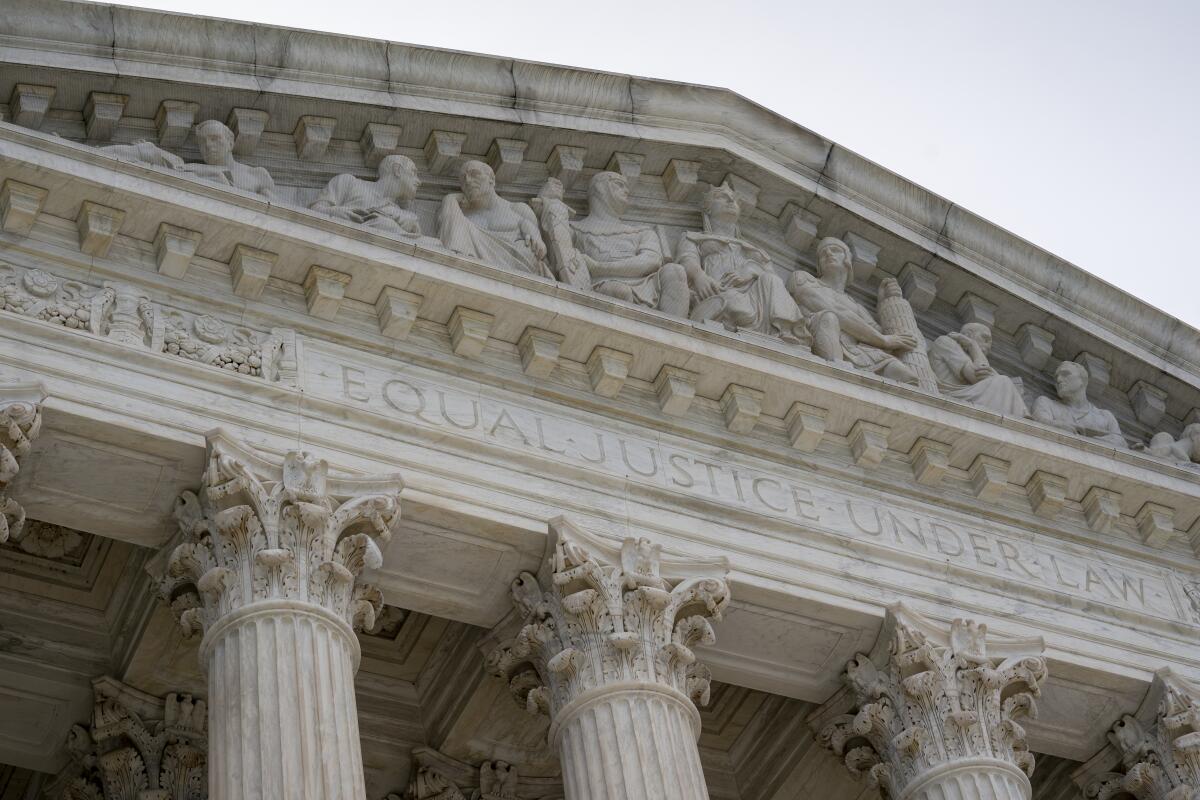Supreme Court sides with Florida GOP to block ex-felons from voting

- Share via
WASHINGTON — The Supreme Court turned down an emergency appeal from voting rights lawyers Thursday, leaving in place what a federal judge in Florida called an unconstitutional “pay-to-vote system” that could prevent hundreds of thousands of ex-felons from casting a ballot this fall.
The decision means Florida residents with prior felony convictions will not be allowed to vote in next month’s primary election and may not able to register for the November election unless they can show they have paid all fees, fines or other debts from their past crimes.
“This court’s orders prevents thousands of otherwise eligible voters from participating in Florida’s primary election simply because they are poor,” Justice Sonia Sotomayor said in a dissent joined by Justices Ruth Bader Ginsburg and Elena Kagan. The court’s “inaction continues a trend of condoning disfranchisement,” she said.
Sotomayor noted the court’s conservatives earlier this year issued emergency orders to block judges’ rulings in Wisconsin and Alabama that would have made it easier for voters to cast ballots by mail so as to avoid exposure to the coronavirus.
In the Florida case, however, they were unwilling to lift a brief appeals court order handed down on July 1 that blocked a judge’s ruling that would have cleared the way for an estimated 774,000 Floridians to restore their right to vote.
The legal dispute over who can vote in Florida has national implications because the state is often a battleground in a presidential election.
Two years ago, nearly 65% of Florida’s voters approved a state constitutional amendment to restore voting rights for residents with past felony convictions “upon completion of all terms of sentence, including parole or probation.” But Republican lawmakers with the backing of Gov. Ron DeSantis passed a bill to redefine the terms of a sentence to include all fees, fines and restitution associated with the past conviction.
However, the state does not have an apparent duty to research and disclose what fees or fines may be owed, and it has not done so. But it is nevertheless threatening prisoners with a criminal prosecution if they register and vote with outstanding debts.
Voting rights lawyers argued this system was unconstitutional for two reasons. They said it violated due process of law because prospective voters were not told and could not learn what they must pay to become eligible to vote. They also said it violates the 24th Amendment adopted in 1964 that said the right to vote may not be “denied or abridged by ... any state by reason of failure to pay any poll tax or other tax.”
U.S. District Judge Robert L. Hinkle agreed with the challengers and put the state law on hold last year. And after a trial in May, he ruled it was unconstitutional to block Floridians from voting solely because they were unable to pay past debts or fines.
But the governor appealed to the full 11th Circuit Court in Atlanta. The court on July 1 issued a one-paragraph order that put the judge’s ruling on hold, but gave no further reasons. The appeals court is expected to hear arguments next month.
Last week, lawyers for the Campaign Legal Center, the ACLU and the NAACP Legal Defense Fund filed an emergency appeal asking the high court to intervene. They noted the court in the past had blocked last-minute judicial orders that could disrupt an election. And they noted the deadline to register to vote in Florida’s primary is July 20.
But the appeal in Raysor vs. DeSantis was denied, with no comment or explanation from the majority.
“This is a deeply disappointing decision,” said Paul Smith, lawyer for the CLC. “Florida’s voters spoke loud and clear when nearly two-thirds of them supported rights restoration at the ballot box in 2018. The Supreme Court stood by as the 11th Circuit prevented hundreds of thousands of otherwise eligible voters from participating in Florida’s primary election simply because they can’t afford to pay fines and fees.”
Julie Ebenstein, an ACLU attorney, said the case is not over. “The courts have repeatedly ruled the Florida law is unconstitutional,” she said. “We are hopeful that the appellate court will uphold the trial court’s decision, protecting the right to vote for hundreds of thousands of Floridians in time for the November election.”
More to Read
Get the L.A. Times Politics newsletter
Deeply reported insights into legislation, politics and policy from Sacramento, Washington and beyond. In your inbox twice per week.
You may occasionally receive promotional content from the Los Angeles Times.









